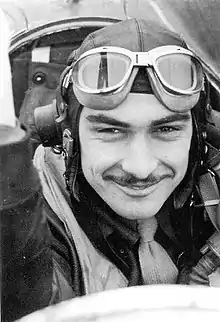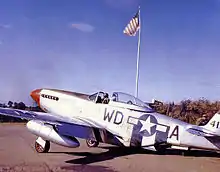James A. Goodson
James Alexander Goodson (March 21, 1921 – May 1, 2014) was a United States Army Air Force fighter ace who was credited with shooting down fifteen aircraft and destroying another fifteen on the ground during World War II.[2][3][4]
James A. Goodson | |
|---|---|
 | |
| Born | March 21, 1921 New York, New York[1] |
| Died | May 1, 2014 (aged 93) Duxbury, Massachusetts |
| Allegiance | Canada United Kingdom United States |
| Service/ | Royal Canadian Air Force (1941) Royal Air Force (1941–42) United States Army Air Forces (1942–47) United States Air Force Reserve (1947–59) |
| Years of service | 1941–1959 |
| Rank | Lieutenant Colonel |
| Unit | No. 416 Squadron RCAF No. 43 Squadron RAF |
| Commands held | 336th Fighter Squadron No. 133 Squadron RAF |
| Battles/wars | World War II |
| Awards | Distinguished Service Cross Silver Star Distinguished Flying Cross (9) Purple Heart Air Medal (21) Distinguished Flying Cross (United Kingdom) Order of Leopold (Belgium) Croix de guerre (Belgium) Knight of the Legion of Honour (France) Croix de guerre (France) |
Military career

Goodson trained initially with the Royal Canadian Air Force (RCAF), at Buffalo, leaving 5 March 1941 as flight sergeant. He joined the Royal Air Force (RAF) in No. 43 Squadron RAF, followed by No. 416 Squadron RAF, then the American Squadron in the RAF, the Eagle Squadron, founded by Charles Sweeny (whose autobiography he later helped write and publish). He joined the United States Army Air Forces (USAAF) on 24 September 1942 as a second lieutenant, before becoming commanding officer of 336th Fighter Squadron of the 4th Fighter Group and deputy commanding officer of the group. He trained with the RCAF on the Harvard II AT-6, with the RAF he first flew Hurricanes then Spitfires and with USAAF a P-47 Thunderbolt and then a P-51 Mustang VF-B. He was missing in action on 20 June 1944, having been shot down by antiaircraft fire [5]while strafing Neu Brandenburg airdrome. He was injured and escaped capture for a few days before being caught and handed over to the Gestapo. He talked his way out of summary execution by teaching his interrogator to blow smoke rings and ended up POW in Stalag Luft III until liberation. His nickname was 'King of the Strafers' for his extreme low flying.
He received more than 22 awards from 5 countries, including the British Distinguished Flying Cross, the American Distinguished Flying Cross 9 times, the Air Medal 21 times, the Purple Heart, the Belgian Order of Leopold with Silver palm Leaf and the French Legion of Honour in the grade of Chevalier (Knight).
Post-war
After the war he settled near his friend Bob Stanford-Tuck in Sandwich, Kent. He had a business career with Goodyear, Hoover and ITT before retiring to write his first memoir, Tumult in the Clouds.
He became an excellent after dinner speaker, a bon vivant, monocle in eye, including Bomber Command dinners, and wrote more books, The Last of the Knights and Overpaid, Oversexed and Over Here (with Norman Franks). He helped set up a publishing company to publish the memoirs of friends and fellow pilots, such as Percy "Laddie" Lucas. This group, with add-ons such as Johnnie Johnson, also went to air shows to "meet the punters". He moved back to Massachusetts in 1993.
He was aboard the SS Athenia when she was torpedoed by U-30 on 3 September 1939.[6]
References
- "James A Goodson". American Air Museum in Britain. Retrieved 2015-10-14.
- Bernstein, Adam (1 May 2014). "James Goodson dies; leading Army Air Forces ace in World War II". New York Times. Retrieved 21 May 2015.
- Shields, Bill (9 May 2014). "Decorated WWII Pilot Laid To Rest In Bourne". WBZ-TV. Retrieved 21 May 2015.
- Ha, Tu Thanh (16 May 2014). "Obituary: How blowing smoke rings saved a PoW's life". The Globe and Mail. Retrieved 21 May 2015.
- Tumult In The Clouds by James A. Goodson©1983 William Kimber & Co.
- "RAF postal cover JS/50/39/1". Royal Air Forces Association. 3 September 1939.
External links
- "James Alexander Goodson". American Air Museum in Britain. Imperial War Museums. Retrieved 8 December 2017.
